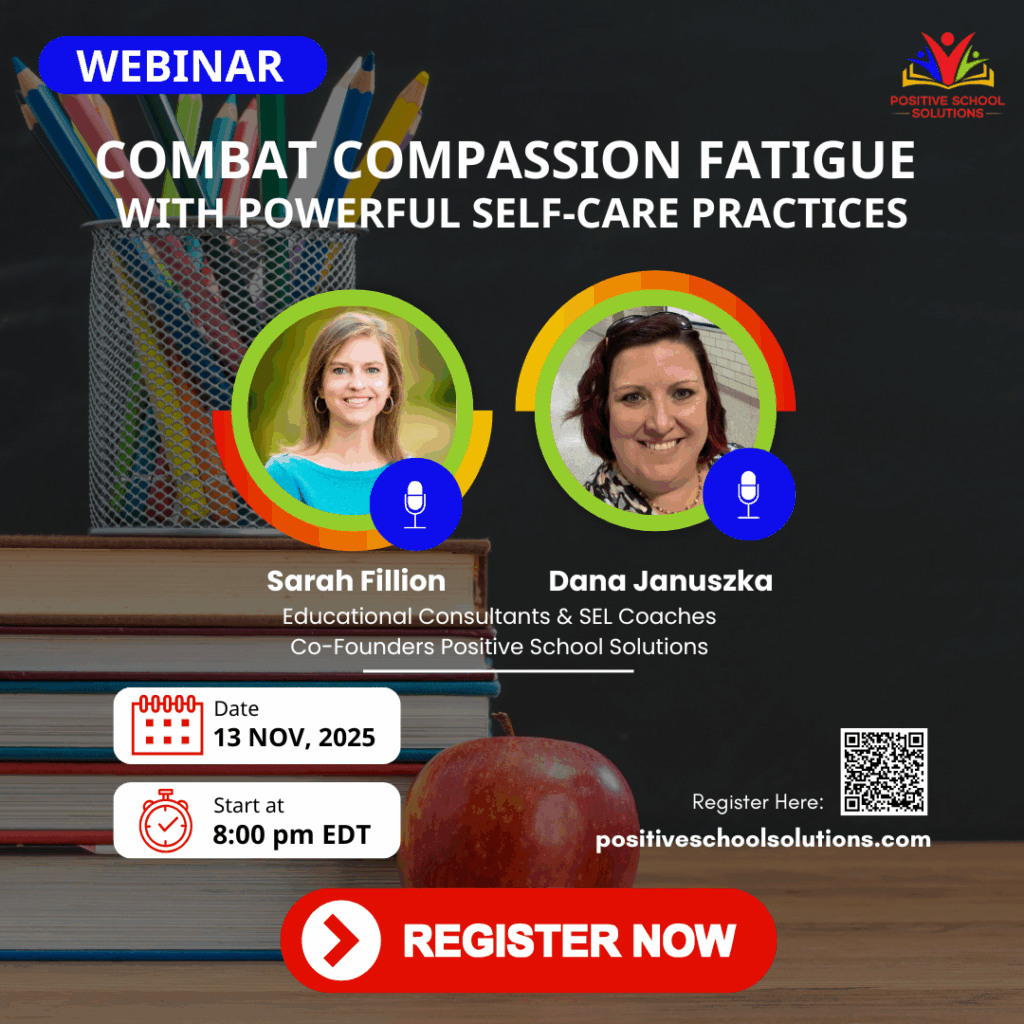As educators, there is a common cycle many of us fall victim to at the start of each school year. In the summer, we rest and rejuvenate, leaving us feeling energized and enthusiastic for the new school year ahead. With all this energy, like a fully charged battery, we then push as hard as we can to set up our classroom, design new lessons, and generally prepare to welcome our students to the new school year, all at the expense of our health. From earlier morning start times to staying up late to cut out one more set of labels, we quickly drain all the energy from our personal batteries. That feeling of being well-rested and rejuvenated is sacrificed and the good habits we established over the summer are pushed by the wayside. When we completely drain our battery again and again, the amount of total charge it can hold lessens over time, leaving us with less energy to give to others, and ultimately to ourselves.
We want to show up for our students and give them the best of us so they are inspired to learn and grow from us each and every day. One way we can do this is by making sure we take time each day for ourselves, so we wake up the next morning with lots to give! Here are 5 SELf-care practices to consider implementing as this school year starts up so your battery is recharged every day.

-
- Set boundaries. The more boundaries we set, the more effective we are during the work periods. When I know I only have 20 minutes to accomplish a task, I am usually able to succeed, but if I give myself 40 minutes for that same task, it would have taken the whole amount of time too! Whether your boundaries are focused around sleeping, only checking email during specific periods of time, or focusing our attention on loved ones, setting them allows us to prioritize what is important to us, provides guidance to others on how we want to be treated, and leaves us feeling renewed because we put our needs first.
-
- Create realistic health goals. We cannot serve the students we work with, support our families, be there for our colleagues, or maintain close relationships if we feel sick, tired, and less than 100 percent. Knowing that our health is important, we must also be realistic when setting health goals to ensure that they are sustainable throughout the school year. While our ideal might be to exercise for an hour, if we know we can only squeeze in 20 minutes each afternoon, a health goal could be going for a walk for 15 minutes each day. Setting that as a goal means that we are more likely to meet it each day. If there is a day that we have more time, we may decide to extend our walk for an hour, which will make us feel even better for exceeding our goal!
-
- Establish (and practice) a positive morning routine. A good morning routine increases feelings of happiness and productivity for the entire day. Each person’s positive morning routine will differ – some individuals find that exercising first makes them feel awake and alert, others reap benefits from journaling, reading, or practicing mindfulness, and yet others use the start of the day to maximize their creativity. Your morning routine should consist of practices that make you feel good, are predictable, and put you in a “can-do” mindset.
-
- Identify healthy stress-relievers. Stress is inevitable in our lives, and having healthy coping mechanisms can support us during those stressful situations and times. Think about what brought you peace over the summer months and helped alleviate stress. Walking in the woods, sitting on a blanket and watching water/waves, petting your dog or cat, or taking part in a favorite hobby are all healthy ways that we can relieve stress. Building these practices into our daily routines, and prioritizing them, help us process stress in a healthy way, devoting less energy and attention to the stress and, in turn, resulting in more energy and focus on things that bring us joy.
-
- Practice Mindfulness. Practicing mindfulness means that we bring attention to the experiences occurring in the present moment without judgment. Meditation can be a powerful part of self-care, as it allows us to let go of what is out of our control, focus on the present, and free ourselves from thoughts or worries that may otherwise weigh us down. Practicing mindfulness throughout the day for short periods of time, such as 1 – 5 minutes at a time, can provide us with a reliable strategy of self-care that can be done anywhere to help us recenter.
We give our best to the students, their families, our colleagues, and the school community as a whole day in and day out. When we keep draining our personal batteries, however, the amount of “best” we have to give shrinks rapidly. This year, we can try something different. We can make it an effort to ensure our battery is recharged, just like we do with our cell phones. By putting in place self-care practices that replenish our personal batteries, we are able to give more of our best to our school communities, and are able to preserve energy for our top priorities as well!
Wishing you the best start to your 2022 – 2023 school year!
For more information on SELf-Care practices, check out some of our other blog posts:
And/or inspire your staff with our Faculty Meetings:
Written by Sarah Fillion & Dana Januszka for Positive School Solutions 2022

